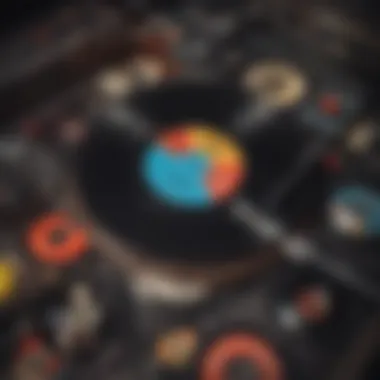Exploring the Soundscape: 1970s Music Playlist


Intro
The 1970s represent a pivotal decade in music history. With a plethora of genres exploding into the mainstream, this era defined boundaries and reshaped popular culture. Genres like rock, disco, and funk were not just sounds; they reflected significant social movements and emotions of the time. Musical innovation was rampant, with technology and creativity merging in ways previously unseen.
Many artists emerged as icons, using their platforms to address societal issues and explore personal themes. The playlist of the 1970s offers not just entertainment but also insight into the zeitgeist of an era characterized by change and conflict.
This article will explore the rich landscape of 1970s music by examining influential artists, notable albums, and crucial tracks. We will unpack the stories behind the songs, diving into lyrical themes, musical composition, and the broader cultural impact of this transformative decade. Through curated playlists and critical analysis, we aim to connect with music enthusiasts, aspiring musicians, and music students, offering a comprehensive guide to the sounds that defined a generation.
As we delve deeper, prepare to reflect on how these melodies and rhythms continue to resonate in contemporary music and culture.
"Music is the universal language of mankind." – Henry Wadsworth Longfellow
Let's embark on this sonic journey and unveil the seminal moments that shaped the soundscape of the 1970s.
Prolusion to 1970s Music
The 1970s marked a transformative decade in music history. This era witnessed an extraordinary diversity of sounds and styles that not only reflected the cultural shifts but also reshaped the musical landscape. In this article, we dissect these elements, offering insights into the genres that emerged, the artists who defined them, and the lasting impact on music today. An understanding of the 1970s music scene is essential for anyone interested in the evolution of contemporary genres and the historical context surrounding the music industry.
The Cultural Context of the 1970s
The cultural backdrop of the 1970s is vital to understand how the music of this era developed. The decade followed a tumultuous period in the late 1960s marked by civil rights movements, anti-war protests, and social upheaval. As society sought change, music became a form of expression reflecting hope, rebellion, and a search for identity.
Popular music in the 1970s reacted to these dynamics. For example, the rise of disco was closely linked to urban nightlife and the celebration of liberation and diversity. Likewise, punk rock emerged as a reaction against perceived excess in music and culture, expressing frustration and challenging norms.
Various socio-political movements influenced artists and their work. The feminist movement inspired female musicians, leading to diverse representations in their music and roles in the industry. Additionally, the environmental movement began to permeate music, with artists addressing ecological concerns in their lyrics.
Overall, the cultural context of the 1970s created a rich soundscape. It allowed different genres to flourish, each addressing distinct themes relevant to that period.
The Evolution of Genres in the 1970s
The 1970s saw significant shifts in musical genres, each evolving to represent different cultural sentiments. Rock music continued to dominate early in the decade but began to splinter into sub-genres.
- Psychedelic Rock transformed, paving the way for heavy metal with bands like Black Sabbath making their mark.
- Folk Rock transitioned into singer-songwriter styles, with artists like Carole King rising to prominence.
- Disco brought rhythm to the forefront, with the emergence of dance-centric tracks that appealed to diverse audiences.
- Funk and Soul flourished, led by figures like Marvin Gaye and Earth, Wind & Fire, who incorporated complex rhythms and rich instrumentation.
Through these evolving genres, the 1970s catered to varied tastes. Musicians began to experiment with sounds, reflecting personal experiences as well as cultural themes.
In summary, the 1970s is a pivotal moment in music history where genres expanded and diversified, paving the way for future innovations. Understanding this evolution lays the foundation for appreciating the artists and albums that followed.
Key Genres of the 1970s
The 1970s was a pivotal decade for music, characterized by an explosion of diverse genres. Each genre contributed uniquely to the soundscape of the time, reflecting the societal changes and cultural movements of the era. Understanding these key genres is essential for comprehending the musical landscape and its ongoing influence.
Rock Music, Disco, Funk, Punk, and Soft Rock all played significant roles in shaping the sound of the '70s. Each genre emerged from specific cultural contexts, with artists pushing boundaries and creating new sounds.
The significance of exploring these genres lies not only in the musical styles themselves but also in their broader implications. They serve as reflections of social developments, from the counterculture of the 1960s carrying into the rock movements, to the nightlife and dance scene epitomized by disco. This exploration also sheds light on the shifting tastes and values of audiences, paving the way for future trends in contemporary music.
Moreover, the interaction between these genres allowed for rich cross-pollination. Artists borrowed elements from one another, creating hybrid sounds that redefined music's evolution. In brief, a look into the key genres of the 1970s reveals a dynamic tapestry of creativity, rebellion, and joy.


Rock Music: The Dominant Force
Rock music ruled the airwaves of the 1970s. Bands like Led Zeppelin, The Rolling Stones, and Pink Floyd were influential in pushing rock to new heights. Their music not only dominated charts but also offered a voice to the youth, expressing their frustrations and aspirations.
The diversity within rock is impressive. From the heavy sound of hard rock to the softer melodies found in folk rock, artists varied their styles greatly. Concept albums became popular, turning the album format into a cohesive piece of art rather than just a collection of songs. This is particularly evident in albums like "Dark Side of the Moon" by Pink Floyd.
The Rise of Disco Culture
Disco emerged prominently in the mid-1970s, marking a significant shift in music and dance culture. The genre is defined by its upbeat rhythms, four-on-the-floor beats, and syncopated bass lines. Donna Summer, often referred to as the Queen of Disco, became synonymous with the movement, delivering hits that are still celebrated today.
Disco was more than just music; it was a cultural phenomenon that fostered a sense of community, particularly among marginalized groups. Nightclubs like Studio 54 epitomized the era, becoming safe spaces for self-expression and celebration. The fashion associated with disco also played a vital role, emphasizing flamboyance and individuality.
Funk and Soul: A Musical Revolution
Funk and soul experienced development during the 1970s, transforming the sound of popular music. Artists like Marvin Gaye and Earth, Wind & Fire brought a unique blend of rhythm and emotion to their songs, which focused on themes of love, struggle, and celebration.
Funk, with its intricate bass lines and strong rhythms, encouraged dancing and movement. It was an expression of cultural pride and often addressed social issues, reflecting the experiences of African American communities. The genre's influence is still seen in contemporary music, especially in hip-hop and R&B.
Emergence of Punk Rock
Punk rock challenged the established norms of the music industry and society at large. Bands such as The Ramones and Sex Pistols embodied an anti-establishment ethos. Their sound was raw, fast, and unapologetic, marked by simple musical structures and direct lyrics.
Punk was not just a genre; it represented a broader cultural movement. It questioned authority, promoting individualism and self-expression. This rebellious attitude resonated with many youth, especially in working-class communities. Punk's influence is seen today in various genres, demonstrating its lasting impact on music and culture.
Soft Rock and Its Appeal
Amidst the more aggressive sounds of rock and punk, soft rock offered a counterpoint with its gentle melodies and introspective lyrics. Artists like Carole King and James Taylor created music that emphasized personal storytelling and emotional depth.
Soft rock was characterized by its appeal to a wide audience. Its melodic nature made it accessible while maintaining a level of sophistication. The genre found popularity on radio stations, ensuring its reach into homes across the country. Its influence can still be felt, as many contemporary artists draw on its comforting elements to connect with listeners.
Notable Artists of the 1970s
The 1970s was a remarkable decade that greatly impacted the music landscape. Notable artists emerged during this period, shaping not just the era but also the future of music. They explored new sounds, broke conventions, and reflected the cultural shifts taking place. Understanding these artists helps to appreciate their contributions and the vast influences they had.
David Bowie: The Chameleon of Rock
David Bowie stands as a significant figure in the 1970s music scene. He released various genres, including glam rock, soul, and electronic music. Bowie's persona shifted constantly, earning him the nickname "The Chameleon of Rock." His albums, such as The Rise and Fall of Ziggy Stardust and the Spiders From Mars, showcased his innovative spirit. His ability to tackle themes of alienation and identity resonated deeply in a rapidly changing society. Bowie's artistic vision challenged traditional views on gender and sexuality, making him a beacon for self-expression among fans.
The Queen of Disco: Donna Summer
Donna Summer is celebrated as the defining voice of disco. Her powerful vocals and energetic performances made hits like "Last Dance" and "Hot Stuff" iconic. Summer's ability to blend R&B, pop, and disco elements helped solidify her position in the genre. She became a symbol of the nightclub culture that flourished during this decade. With her success, Summer broke barriers for female artists, demonstrating that they could lead and dominate the music charts. Her influence is still felt in dance music today.
Led Zeppelin: Pioneers of Hard Rock
Led Zeppelin is often regarded as one of the most influential hard rock bands of all time. With their unique sound, they blurred the lines between rock, blues, and folk. Albums like Led Zeppelin IV featured tracks such as "Stairway to Heaven," which remains a staple in rock history. Their heavy guitar riffs and complex compositions set the stage for future rock musicians. Led Zeppelin's music characterized the spirit of the 1970s rock movement, inspiring countless bands that followed.
The Legacy of Fleetwood Mac


Fleetwood Mac's Rumours is one of the best-selling albums in history. The dynamic interplay of musicians, especially the contributions from Stevie Nicks and Lindsey Buckingham, created a harmonious blend of rock and pop. The personal relationships and struggles within the band added depth to their music. Songs like "Go Your Own Way" and "Dreams" explore themes of love, heartbreak, and resilience. Fleetwood Mac's success during the 1970s illustrates the impact of personal narratives in songwriting.
The Influence of Marvin Gaye
Marvin Gaye played a crucial role in the evolution of soul music in the 1970s. His album What's Going On is often regarded as one of the greatest albums of all time. Gaye addressed social issues, such as civil rights and environmental concerns, with sincerity and depth. His smooth voice and poignant lyrics resonated with listeners. Gaye's influence transcended the music; he became a voice for a generation seeking change and understanding.
Iconic Albums from the 1970s
The 1970s produced an array of albums that not only defined the sound of the decade but also influenced countless artists and genres that followed. These albums serve as touchstones for listeners and music scholars alike. They encapsulate the cultural zeitgeist, reflecting the social realities and attitudes of the time. Understanding these iconic albums helps grasp the evolution of music during this transformative decade.
Dark Side of the Moon: A Conceptual Masterpiece
Released in 1973 by Pink Floyd, Dark Side of the Moon is often hailed as one of the greatest albums in music history. Its rich thematic content navigates various aspects of human experience, such as mental health, conflict, and the passage of time. Pink Floyd's innovative use of studio technology to create soundscapes was groundbreaking. Songs like "Time" and "Money" resonate deeply due to their relatable lyrics and experimental sounds. The album's seamless flow allows it to be experienced as a whole rather than as individual tracks, marking it as a true conceptual masterpiece.
Hotel California: A Cultural Phenomenon
The Eagles' 1976 album Hotel California not only dominated the charts but also injected a significant cultural commentary into popular music. The title track, with its haunting lyrics and intricate guitar solos, depicts a critique of the hedonistic lifestyle associated with the music industry. The album's fusion of rock and folk elements captures the essence of 1970s California, resulting in a sound that is both nostalgic and timeless. The lush harmonies and rich instrumental arrangements further solidify its status as an enduring classic.
Songs in the Key of Life: A Soulful Journey
Stevie Wonder's Songs in the Key of Life, released in 1976, is a landmark album known for its diversity and musical sophistication. Blending soul, pop, and jazz influences, the double album showcases Wonder's impressive artistry. Tracks such as "Isn't She Lovely" and "Sir Duke" highlight his unique vocal style and masterful use of instrumentation. This album not only earned critical acclaim but also achieved commercial success, establishing Wonder as one of the most significant figures in 1970s music.
Rumours: The Soundtrack of a Generation
Fleetwood Mac's Rumours, released in 1977, is frequently lauded as one of the best-selling albums of all time. The work came out of personal turmoil within the band, yet it forged a sound that captured a generation's emotions. Songs like "Go Your Own Way" and "Dreams" resonate with themes of heartbreak and introspection. The harmony and melodic structure within each track create an engaging experience that appeals to a wide audience. Its blend of rock and pop has left an indelible mark on future artists.
Bat Out of Hell: A Rock Opera
Meat Loaf's Bat Out of Hell, released in 1977, brings theatricality to rock music. The album combines rock, operatic influences, and vivid storytelling to create a unique experience. The title track is a dramatic narrative that showcases both vocal prowess and instrumental finesse. Tracks like "Two Out of Three Ain't Bad" became perennial favorites, highlighting the album's ability to cross genre boundaries. It remains significant for its innovative approach to rock music and has continued to inspire performers across various styles.
The 1970s not only showcased albums that defined musical boundaries but also captured emotions and cultural shifts that resonate today.
The Legacy of 1970s Music
The legacy of 1970s music remains a pivotal point of reference in the realm of modern music. The decade was not merely a collection of popular songs; it was a cultural movement that shaped the sound and style of subsequent generations. As we look back, we see how the music from this era introduced innovative techniques, genre-blending, and lyrical depth that continues to influence artists today. Its importance cannot be overstated; it laid the foundation for many music genres we appreciate now, such as rock, disco, punk, and hip-hop.
Many artists emerged during this time who would go on to revolutionize music. They experimented with productions that incorporated diverse influences, leading to a rich soundscape that characterized the decade. Artists like David Bowie, with his daring character shifts, gave voice to the complexities of identity, while Donna Summer helped define disco with her vibrant rhythms and powerful storytelling. The sheer variety of music in the 1970s also fostered a greater cultural dialogue.
The music of the 1970s serves as the backbone for contemporary music genres, setting trends and challenging artists to push boundaries.
Through critical listening, one can identify elements of 1970s music in the works of today’s stars, from the electronic beats reminiscent of Giorgio Moroder’s productions to the lyrical introspection found in modern rock. The ability of 1970s music to adapt and thrive in today’s landscape speaks volumes about its enduring impact.
Influence on Contemporary Music
The influences of the 1970s on contemporary music can be seen across various genres. Electronic music, for instance, owes much to the early innovations of Kraftwerk and other artists who were pioneers in integrating synthesizers and technology into their sound. Today, we find these elements in pop and electronic music, as artists like Dua Lipa and The Weeknd intentionally integrate retro sounds into their productions.
Moreover, hip-hop has roots that can be traced back to funk and soul artists of the 1970s. The rhythmic beats created by artists, such as Chic and their track "Good Times," have been famously sampled in numerous hip-hop tracks, demonstrating the direct connection to earlier music styles. Furthermore, the lyrical narrative and social commentary found in 1970s music resonate with many modern artists, making the messages timeless.
The Continued Popularity of 70s Hits
The enduring popularity of 1970s hits is evident in various cultural contexts today. Many radio stations still play classic tracks, and numerous playlists highlight 1970s music for its timelessness. Films and television shows frequently tap into this era for soundtracks, as the music evokes a sense of nostalgia and familiarity.
Additionally, cover bands and tribute concerts flourish, showcasing the music of the 1970s. Platforms like Spotify and Apple Music feature dedicated playlists, encouraging new generations to discover these iconic tracks. The songs from the 1970s do not simply fade into the background; they create enduring connections, reminding us how powerful and relevant this decade's music still is.
The tribal essence of 1970s music continues to bring people together, be it through dance, listening experiences, or shared memories. Music enthusiasts, aspiring musicians, or those keen to learn can look to this rich era, not just for entertainment but for an understanding of music's capability to reflect society and culture.
Creating Your Ultimate 1970s Playlist
Creating a playlist that encapsulates the essence of the 1970s is both an art and a responsibility. This decade produced a wealth of music that not only defined genres but also reflected sociocultural changes and artistic experimentation. A well-crafted playlist can capture the moods and themes of the time and ensure that the memorable tracks resonate with contemporary listeners.
Selecting Essential Tracks
When curating your 1970s playlist, selecting essential tracks is fundamental. Here are some guiding points:
- Identify Genre Representation: Aim for a mix of core genres such as rock, disco, punk, funk, and soul. Each brings its own flavor and storytelling.
- Incorporate Classic Hits: Songs like “Stairway to Heaven” by Led Zeppelin or “I Will Survive” by Gloria Gaynor are vital. They are not just popular; they are emblematic of the era’s creativity and emotion.
- Balance Mainstream and Lesser-Known Tracks: Including well-loved hits creates instant recognition, while hidden gems offer unique experiences. Consider “Do You Wanna Dance” by Bette Midler or “Rock Lobster” by The B-52s.
- Reflect Diversity: The 1970s was rich in cultural influences; ensure representation across different backgrounds to provide a comprehensive listening experience.
Understanding the Context of Each Track
Beyond the notes and lyrics, understanding the context behind each track enhances the overall experience. Knowing why a song was created and its impact can deepen the listener's appreciation:
- Historical Background: Research the societal influences during a song’s release. For example, Marvin Gaye’s “What's Going On” reflected the political and social turbulence of the time.
- Artist’s Intent: Many artists were pushing boundaries. Understanding David Bowie’s aim to challenge norms with “Changes” can open new perspectives on the song’s meaning.
- Production Techniques: Some tracks pioneered recording methods that changed music forever. Recognize how producers like Quincy Jones shaped tracks with innovative techniques in albums like “Off the Wall.”
Exploring Theme-Based Playlists
Theme-based playlists present an alternative approach by grouping songs around specific motifs, enhancing the listening experience further:
- Mood-Centric Playlists: Assemble playlists that evoke emotions. For instance, a relaxed evening mix could feature “Harvest Moon” by Neil Young alongside “Breathe” by Pink Floyd.
- Cultural Movements: Create curated collections around trends of the decade, such as a disco night playlist featuring hits from Donna Summer and the Bee Gees.
- Decade-Specific Events: Consider events like the Apollo Moon landing. A playlist created around this theme could include “Space Oddity” by David Bowie.
A well-designed playlist not only showcases the music of a decade but also tells a story of history, culture, and emotions.
Through selecting tracks thoughtfully, understanding their background, and exploring thematic avenues, your ultimate 1970s playlist will be one that not only entertains but also educates and evokes deeper connections to the music and era.
Culmination: The Enduring Impact of 1970s Music
The music of the 1970s remains a fundamental pillar in the history of popular culture. This era brought revolutionary changes across genres and cultural landscapes. The impact of 1970s music does not just reside in its catchy melodies and unforgettable rhythms; it also encompasses its profound ability to connect with societal shifts, emotional landscapes, and individual beliefs.
Several critical factors underline the significance of this decade in music history:
- Cultural Shifts: The 1970s encapsulated a time when social movements were reshaping society. Artists like Marvin Gaye and Donna Summer addressed issues such as love, social change, and empowerment, making tracks that resonate well beyond their time.
- Genre Innovations: The decade saw the birth of multiple genres and sub-genres, such as punk rock and disco. Artists and bands pushed boundaries and redefined musical norms, thereby paving ways for future explorations in sound.
- Timeless Tracks: Many of the songs from this decade endures through the decades. Tracks from creators like Led Zeppelin and Fleetwood Mac continue to enjoy popularity. They are often cited in contemporary playlists, showcasing their lasting appeal.
- Legacy of Artists: The artists from the 1970s have inspired generations. Their work lays the groundwork for today’s musicians, highlighting the interconnectedness of music through time.
Reflecting upon the era not only reveals a rich musical landscape but also encourages us to consider the historical context that shaped it. This understanding allows music enthusiasts and scholars alike to appreciate the depth and breadth of 1970s music and its influence on today’s music culture.
Reflecting on the Era
When looking back at the 1970s, it is essential to consider how the music of that time reflected broader societal themes. One can trace significant trends that sparked change and innovation. This reflection includes themes of rebellion, love, and social justice, making the 1970s a pivotal decade.
The rise of counterculture movements and progressive ideas coincided with the music of this time. Punk rock emerged as a response to mainstream ideals, while disco provided a space for celebration and self-expression. These contrasts illustrate the diverse soundscape of the decade.
The sentiments found in the songs of this era often mirror the hopes and fears of the people, providing a soundtrack to their lives. Each genre contributed a color to the musical palette of the time, ensuring its depth and richness.
A critical examination reveals that much of the 1970s music still resonates today. The fight for rights, acceptance, and freedom echoes through lyrics and styles that continue to inspire new generations.
The music of the 1970s is not merely a relic; it’s a living testament to human experience, encapsulating our struggles and triumphs in sound and rhythm.







